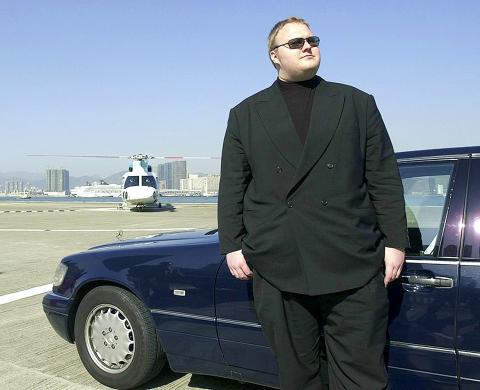He lived a life dominated by fast cars, holidays on US$10 million yachts and an obsession with shoot ‘em up computer games. But on Wednesday associates of Kim Dotcom, the former hacker wanted by the FBI over download sites allegedly costing copyright holders at least US$500 million, claimed his cartoon-like image was carefully calculated to help earn him a fortune. In fact, they said, it obscured a sharp and decisive business intelligence.
Dotcom, the 38-year-old German founder of Megaupload.com formerly known as Kim Schmitz, was refused bail on Wednesday by a New Zealand judge who warned he may try to flee the country if he were released from jail pending an extradition hearing on Feb. 22 concerning online piracy charges in the US.
Citing the discovery of unlicensed and illegal guns at Dotcom’s rented mansion north of Auckland, where he was arrested with three others on Saturday, David McNaughton said “flight risk remains a real and significant possibility, which I cannot discount.”

Photo: AFP
Dotcom appeared at North Shore district court wearing an all-black outfit. Speaking afterwards his lawyer, Paul Davison, said he was “very disappointed” and that Dotcom “has no intention whatsoever of endeavoring to leave New Zealand.” He said his client would appeal against the decision.
Public fascination with the Megaupload case has been fueled this week by details of Dotcom’s flamboyant lifestyle, conducted under a variety of aliases, including Kimble, King Kimble and Kim Tim Jim Vestor. In 2001, for example, he embarked on a lavish trip to Monaco involving a fleet of supercars, a huge yacht and helicopters. Dotcom also commissioned a documentary for the occasion, which was fronted by a German TV comedian, Frank Lammermann. The real purpose, a former associate who organized the holiday said, was to create a sense of greater wealth than Dotcom actually had while he was raising finance for new businesses.
“The parties were in part advertising and PR,” said the associate, who spoke on condition of anonymity. “He wanted to show how he was the biggest and greatest and how he had money. Back in 2000 he didn’t have as much money as he showed the world he did.”

Photo: Reuters
The film Kimble Does Monaco shows his entourage on board the Golden Odyssey with bikini-clad women, including Playboy model Gitta Saxx. In one scene a group of semi-naked women is sprayed with champagne by the yacht’s pool while “Captain Kim” looks on, decked out in black suit and polo neck and black and white shoes. In another scene he is serenaded by his cronies around a grand piano, before they decamp to watch the Monte Carlo grand prix from a party room directly above the starting grid.
The flamboyance and cult of personality masked not only his intelligence, but also his background and true personality, the associate said.
“I was close to him, but I never really knew what he was thinking about. Sometimes he was a really nice guy and at other times he was awful. But he was really good at bringing people around him and getting them to do their best for him. He was able to talk to them and motivate them to do what he wanted.
“He never talked about his childhood, though I believe he had no contact with his father. He was a bit like the fat boy with no friends who only had his computer.”
Indeed, even as the FBI was finalizing a charge sheet over Christmas, accusing him of racketeering and money laundering in one of the largest criminal copyright cases ever brought by the US, Dotcom posted a video of himself becoming the world’s leading player of the computer game Call of Duty: Modern Warfare 3. His colleagues marked the achievement of the best “kill to death ratio” by whooping and firing confetti over him and preparing a celebratory cake in the shape of a number 1.
Another former business colleague, again speaking anonymously, said Dotcom was “a very smart guy, very clever, very quick on the uptake, very driven, very pedantic.” While he was trustworthy — “within reason” — he at times showed symptoms of “anger issues,” and too often “thought money could fix everything,” she said. “He likes playing God.”
Dotcom grew up in Kiel, near Hamburg. Having started as a hacker, he then helped firms with IT security. By 2000 he had founded a venture capital firm, Kimvestor, began to make his fortune and became a fixture on Munich’s party scene. As the dotcom bubble burst in early 2001, he bought shares in a struggling Web site and promised to invest more before cashing-in as the share price rose. Then things went wrong. He was arrested in Thailand in January 2002 and spent five months in jail before being convicted in Munich of insider trading. He was sentenced to 20 months’ probation and fined US$132,000.
He recently said he had come to regret flaunting his wealth, and defended his conduct during the dotcom high. “My mistake was that I embraced the media and gave them the stories they wanted,” he wrote on the Web site Torrent Freak last month. “Let’s just put this into the category ‘young and stupid.’ I was giving them a glimpse into my exclusive lifestyle. For this openness I was turned into the scapegoat when the German new economy bubble popped in 2000.
“I was convicted for insider trading (actually saving a company and over 120 jobs) and got a probation sentence because the judge and prosecutor offered a deal to my lawyers. My criminal record has been cleared under Germany’s clean slate legislation. Officially I can say I am without convictions. I made mistakes when I was young and I paid the price. I am 37 years old now, I am married, I have three adorable children with two more on the way (twin girls — yeah) and I know that I am not a bad person. I have grown and I have learned.”
Neighbours close to Dotcom’s rented 12-hectare property near Auckland have confirmed he had adopted a relatively low profile before his arrest. “We see him driving around, but he keeps to himself and we’re quite close neighbors,” said Libbi Darroch, at Coatesville pony club. “I’ve seen him driving around with his “GUILTY” number plate.”
But regardless of this lower profile, the FBI indictment of Dotcom and four others calls for the forfeiture of cash worth US$275 million and listed 57 bank accounts in Australia, Slovakia, the Philippines, the Netherlands, Singapore, China, Germany and New Zealand. The list of assets includes 15 Mercedes cars with number plates including STONED, MAFIA and POLICE, as well as a Maserati, a Rolls-Royce Phantom with the number plate GOD, and a Lamborghini, along with 60 computer servers and various sculptures and artworks.
The indictment also alleges that between April and June last year, Dotcom’s companies paid almost US$8 million to rent yachts in the Mediterranean.
Meanwhile in the Netherlands, the prosecutor’s office said Dutch police had arrested a fifth suspect in the alleged conspiracy, identified in the US as Andrus Nomm, a 32-year-old Estonian. He has been detained for 60 days pending an extradition request.

June 23 to June 29 After capturing the walled city of Hsinchu on June 22, 1895, the Japanese hoped to quickly push south and seize control of Taiwan’s entire west coast — but their advance was stalled for more than a month. Not only did local Hakka fighters continue to cause them headaches, resistance forces even attempted to retake the city three times. “We had planned to occupy Anping (Tainan) and Takao (Kaohsiung) as soon as possible, but ever since we took Hsinchu, nearby bandits proclaiming to be ‘righteous people’ (義民) have been destroying train tracks and electrical cables, and gathering in villages

Dr. Y. Tony Yang, Associate Dean of Health Policy and Population Science at George Washington University, argued last week in a piece for the Taipei Times about former president Ma Ying-jeou (馬英九) leading a student delegation to the People’s Republic of China (PRC) that, “The real question is not whether Ma’s visit helps or hurts Taiwan — it is why Taiwan lacks a sophisticated, multi-track approach to one of the most complex geopolitical relationships in the world” (“Ma’s Visit, DPP’s Blind Spot,” June 18, page 8). Yang contends that the Democratic Progressive Party (DPP) has a blind spot: “By treating any

Swooping low over the banks of a Nile River tributary, an aid flight run by retired American military officers released a stream of food-stuffed sacks over a town emptied by fighting in South Sudan, a country wracked by conflict. Last week’s air drop was the latest in a controversial development — private contracting firms led by former US intelligence officers and military veterans delivering aid to some of the world’s deadliest conflict zones, in operations organized with governments that are combatants in the conflicts. The moves are roiling the global aid community, which warns of a more militarized, politicized and profit-seeking trend

This year will go down in the history books. Taiwan faces enormous turmoil and uncertainty in the coming months. Which political parties are in a good position to handle big changes? All of the main parties are beset with challenges. Taking stock, this column examined the Taiwan People’s Party (TPP) (“Huang Kuo-chang’s choking the life out of the TPP,” May 28, page 12), the Democratic Progressive Party (DPP) (“Challenges amid choppy waters for the DPP,” June 14, page 12) and the Chinese Nationalist Party (KMT) (“KMT struggles to seize opportunities as ‘interesting times’ loom,” June 20, page 11). Times like these can